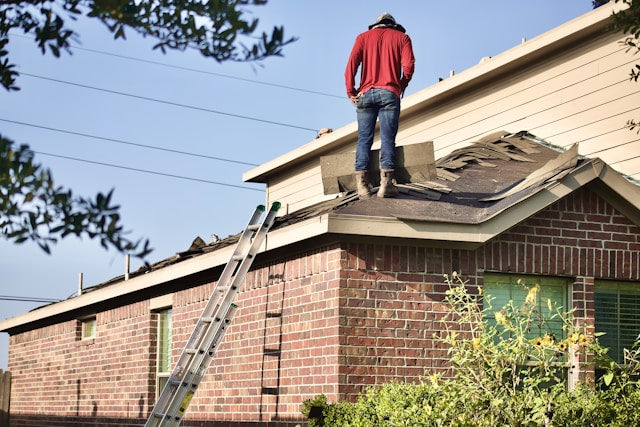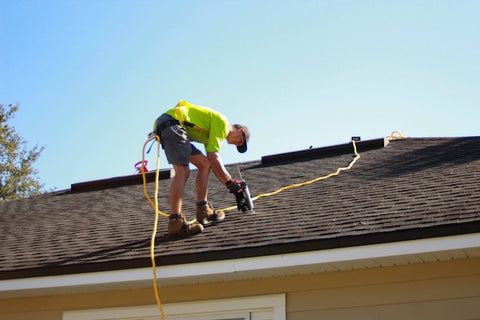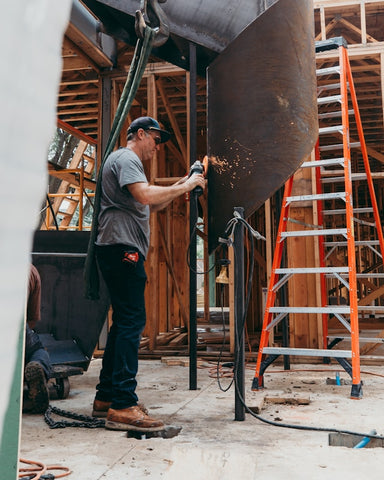
Roof Repair vs. Replacement: What You Need to Know
When the roof over your head shows signs of wear or damage, a critical decision looms: repair or replace. This choice can have significant financial and practical implications, making it crucial for homeowners to understand the factors at play.
In this blog post, we'll explore the key considerations that can help you determine whether a repair will suffice or if a full replacement is necessary. From evaluating the extent of damage to understanding the long-term implications of each option, we're here to guide you through making the best decision for your home and budget.

Roof Repair: Is It the Best Choice?
As a homeowner, your first instinct might be to opt for repairs rather than a full replacement. After all, it's the more affordable and less time-consuming option. However, before you make any decisions, there are a few key factors to consider.
Extent of Damage
The first step in determining if a repair is the best choice is evaluating the extent of damage to your roof. Minor issues, such as a few missing shingles or minor leaks, can often be fixed with repairs. However, a full replacement may be necessary if the damage is extensive and affects a large portion of your roof.
Age and Lifespan
Another crucial factor in deciding between repair and replacement is the age of your roof. Most roofs have an expected lifespan of 20-25 years, so if your roof is approaching or past this age, it may be more cost-effective in the long run to replace it rather than continually repair it.
Cost Comparison
While repairs may seem cheaper upfront, they can add up over time. In some cases, a full replacement might be more cost-effective in the long run, especially if your roof is nearing the end of its lifespan.
Energy Efficiency Considerations
Energy efficiency is another critical factor when deciding between repairing or replacing your roof. Older roofs or those in disrepair may not insulate your home effectively, leading to higher energy bills as your heating and cooling systems work harder to maintain comfortable indoor temperatures. Replacing an inefficient roof with a new, energy-efficient model can significantly reduce your energy costs and improve your home’s comfort.
Resale Value Impact
The state of your roof can also significantly impact the resale value of your home. A brand-new roof is an attractive feature for potential buyers, signaling that they won’t need to worry about roof-related issues for years to come. Conversely, a roof in poor condition can dramatically decrease your home's market value. If you're considering selling your home in the near future, investing in a roof replacement might be the savvy choice to enhance its appeal and market value.
When Is a Roof Replacement Due?
While repairs may be a viable option for some roofs, certain red flags indicate it's time for a full replacement. If you notice any of the following issues with your roof, it's likely due for a replacement.
Extensive Leaking
If your roof is experiencing widespread or multiple leaks, it’s a strong indicator that its protective capabilities have been compromised. While minor leaks can usually be repaired, extensive or multiple leaking points suggest systemic failure, necessitating a complete roof replacement.
Sagging Roof Deck
The roof deck should remain straight and strong; any signs of sagging or visible structural stress indicate severe underlying issues. A sagging roof deck often means trapped moisture and weakened materials, which can only be resolved with a full replacement.
Significant Moss or Algae Growth
While small amounts of moss or algae can often be cleaned, excessive growth is a sign of moisture retention that can damage roofing materials over time. If your roof is covered in large patches of moss or algae, it's indicative of potential decay beneath the surface, pointing to the need for a replacement.
Aging Roof Beyond Repair
An obvious sign that a replacement is due is simply the age of your roof. If your roof has surpassed its expected lifespan and repairs are becoming more frequent and costly, it's time to consider a full replacement to ensure your home is adequately protected.
Visible Daylight Through the Roof Boards
If you can see daylight through your roof boards from inside your attic, it’s a clear sign that your roof is failing. This indicates not only potential leaks but also a serious loss of insulation, making replacement necessary to protect your home from the elements and prevent energy loss.

Damaged or Missing Shingles
Over time, shingles can become cracked, warped, or even go missing due to extreme weather conditions or natural wear and tear. This exposes your home to potential water damage and can compromise the roof's overall integrity. Regular inspections can help identify these issues, but widespread damage often necessitates a full roof replacement to ensure adequate protection against the elements.
Granule Loss on Shingles
Another telltale sign of roof deterioration is granule loss on asphalt shingles. Granules play a critical role in protecting the roof from UV rays and weathering. Over time, as shingles age, they start losing these granules, which can often be found in gutters and downspouts. Significant granule loss reduces the effectiveness of shingles and often indicates that the roof is nearing the end of its useful life, making replacement a wise investment.
FAQ
How much does it cost to repair or replace a roof?
The cost of repairs or replacement can vary greatly depending on the size and complexity of the job, as well as the materials used. For a precise estimate, it is advisable to obtain quotes from trustworthy roofing contractors.
How long does a roof replacement typically take?
Again, this varies depending on the size and complexity of the job, but most roof replacements can take anywhere from one to three days. Your roofing contractor should be able to provide a more accurate timeline for your specific project.
Can I replace just a section of my roof instead of the whole thing?
In certain instances, opting to replace only a section of your roof instead of the entire structure might seem feasible. Nonetheless, this approach could prove more expensive over time, introducing uneven aging and potential future issues. Seeking advice from an experienced roofing contractor is recommended to identify the most suitable course of action tailored to your unique circumstances.
Final Verdict
Ultimately, the decision to repair or replace your roof depends on a variety of factors, including cost, energy efficiency, resale value impact, and the condition of your roof. If you're unsure about which option is best for you, it's always wise to consult with a reputable roofing contractor who can assess your specific situation and provide expert recommendations. Remember that investing in a new, energy-efficient roof can not only save you money in the long run but also improve your home's comfort and market value. View the source to learn more about the benefits of roof replacement.
Leave a comment
Comments will be approved before showing up.



